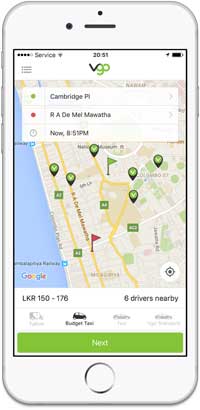Wednesday Feb 18, 2026
Wednesday Feb 18, 2026
Monday, 25 January 2016 00:00 - - {{hitsCtrl.values.hits}}
 The transport and logistics industry is in a phase of dramatic transformation. The increasing use of GPS for fleet tracking and the fast growth of smartphone usage have brought service providers and customers closer, making it easier than ever to offer fast, efficient and cost-effective solutions for moving people and goods. Traditional players in the industry—most notably taxi operators—are being challenged by these disruptive new entrants to the market.
The transport and logistics industry is in a phase of dramatic transformation. The increasing use of GPS for fleet tracking and the fast growth of smartphone usage have brought service providers and customers closer, making it easier than ever to offer fast, efficient and cost-effective solutions for moving people and goods. Traditional players in the industry—most notably taxi operators—are being challenged by these disruptive new entrants to the market.
One Sri Lankan company that has garnered international attention for its logistics technology platform is Vgo. Launched just a few months ago, Vgo was announced as a complete package that could bring Uber-like capabilities to any taxi or transport service through its automated dispatch system and mobile apps. By the end of 2015, several operators in Australia and Malaysia were using Vgo for their taxi and delivery services.
Now Vgo is launching in Sri Lanka as its own taxi hailing service. Last week the company started inviting users for a closed private beta test of its mobile apps, and today its online booking form is going live. Accessible from www.vgo.lk, it acts as a web-based interface for customers to book tuktuks, budget taxis or standard cars available on the Vgo fleet in Colombo.
“We’re excited to make Vgo available to the people of our home city,” says Vgo CEO Lankitha Wimalarathna.
“People can now easily book rides online from our website, and they can also sign up for the private beta of our iOS and Android mobile apps. We’re sending out beta invitations every day and slowly growing our customer base.”
During this beta phase Vgo is offering a 20% discount on all rides. By working closely with the limited number of passengers who are trying out the beta apps, Wimalarathna believes they can improve the service and eliminate issues before going public.
Vgo is also the first service in Sri Lanka to support both cash and card payments, including local debit cards. Passengers are charged only at the end of the ride regardless of the payment method they choose. According to Wimalarathna, this flexibility with payments is a key feature that sets Vgo apart from the competition.
“Paying with cash is often a necessary hassle in Sri Lanka given the low adoption of credit cards. Debit cards are also quite popular, but other operators don’t support them. We support all three payment methods so our customers don’t have to worry about how they’re going to pay.”
Vgo will face stiff competition from both local and international players who are already active in Colombo. What motivated the company to enter the market directly rather than offering its platform to local taxi operators who don’t yet have their own mobile apps?
“When we launched Vgo as a software-as-a-service, going live with our own taxi hailing apps was not a very high priority. Our goal was to work with established operators as their technology partner, which is in fact the role we play in Australia and Malaysia. But despite making a strong case for Vgo, we didn’t succeed in convincing potential customers here,” Wimalarathna answers laughingly.
“However, we should note that traditional taxi and cab services are operating on borrowed time. They are still doing well at the moment, but if they fail to adapt to the changing market very soon, they face a bleak future. On the other hand, we at Vgo didn’t want to let go of the opportunities presented by a country that is going through a transformative phase.”
Wimalarathna invites everyone interested in working with Vgo as beta testers to sign up from their website, www.vgo.lk. They have also opened up a hotline at 0112-222-333 for inquiries and bookings.